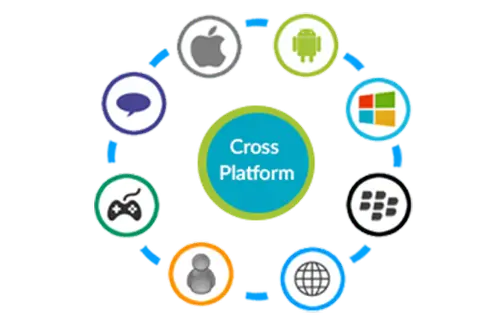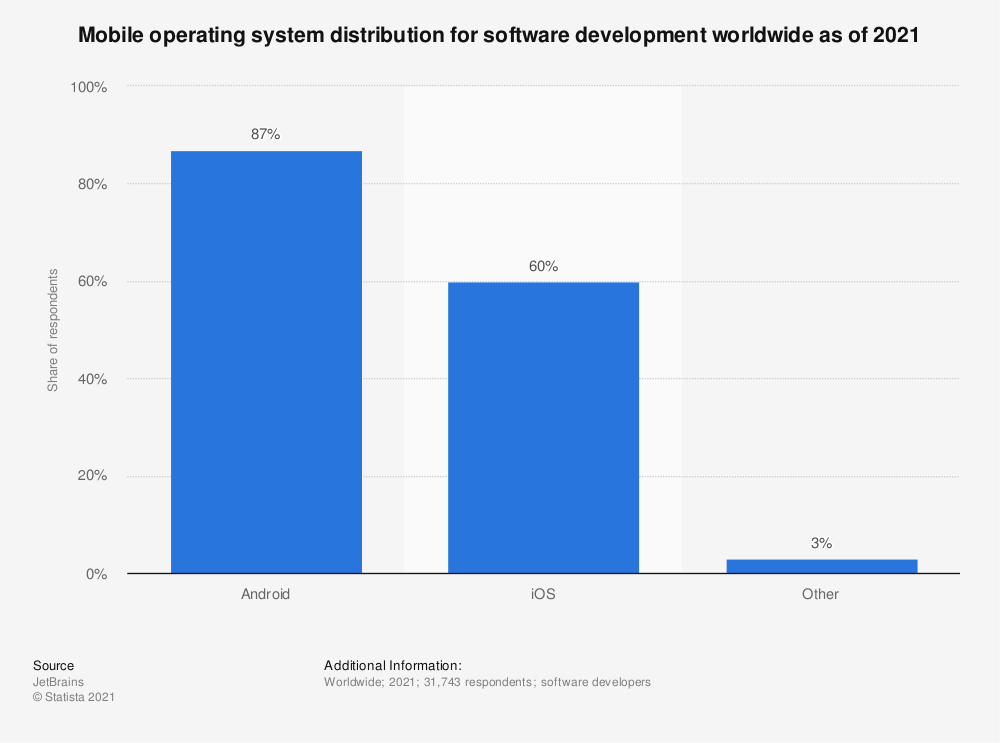Today, as the competition in the app development sector becomes severe, businesses are looking forward to getting the most out of their projects. From startups to large corporations, apps are helping them with numerous advantages. High-performance cross-platform mobile apps, and the ability to develop them in a robust and fast workflow, are something that big companies and small businesses alike seek out. Cross-platform app development allows users to build apps for one platform that can be deployed on multiple platforms. There are cross-platform mobile app development tools that seek to expand the digital business assets of development firms by engineering mobile applications. As more developers seek to expand their mobile apps, the time, resources, and monetary funds required for the projects are the greatest considerations. Companies that use cross-platform development can reduce their expenses by relying on a single platform for multiple platforms.
 Image Source : https://5.imimg.com/data5/HQ/BA/LV/GLADMIN-32265569/crossplatform1-500×500.png As Hacker Noon stated, the cross-platform mobile app development will generate $7.9 Billion by 2021 and indicated that the presence of multi-device usage has increased over the past few years. The central question that remains is, what mobile app development framework will work best for you and your business? According to research by Statista, 83% of businesses target launching an app on Google Play, and 59% of respondents develop apps for Apple’s App Store.
Image Source : https://5.imimg.com/data5/HQ/BA/LV/GLADMIN-32265569/crossplatform1-500×500.png As Hacker Noon stated, the cross-platform mobile app development will generate $7.9 Billion by 2021 and indicated that the presence of multi-device usage has increased over the past few years. The central question that remains is, what mobile app development framework will work best for you and your business? According to research by Statista, 83% of businesses target launching an app on Google Play, and 59% of respondents develop apps for Apple’s App Store.
 Credits: Statista Both Google Play and Apple’s App Store control the vast majority of mobile app downloads, and that makes developing native Android or iOS apps the most expensive route for startups and other small businesses. That’s why cross-platform mobile app development tools are so essential. These days, cross-platform development has become a popular way of creating apps. It allows the developers to develop an app that can run on multiple platforms, including iOS, Android, and Windows, with just a single codebase. Whether you’re a newbie, an expert in mobile app development, a small or large enterprise, with the increasing innovations in technology, it is crucial to be up-to-date with the latest cross-platform app development tools. It can speed up your app development process and help you build better apps. With years of profound knowledge in app development, Squash Apps has a team of exquisite developers and designers who can create the most alluring applications tailored to the customers’ needs. Pertaining to our vast expertise in this field, we’ve compiled a listicle containing the best cross-platform app development tools that are worth your time and quality in 2021. Let’s dive in.
Credits: Statista Both Google Play and Apple’s App Store control the vast majority of mobile app downloads, and that makes developing native Android or iOS apps the most expensive route for startups and other small businesses. That’s why cross-platform mobile app development tools are so essential. These days, cross-platform development has become a popular way of creating apps. It allows the developers to develop an app that can run on multiple platforms, including iOS, Android, and Windows, with just a single codebase. Whether you’re a newbie, an expert in mobile app development, a small or large enterprise, with the increasing innovations in technology, it is crucial to be up-to-date with the latest cross-platform app development tools. It can speed up your app development process and help you build better apps. With years of profound knowledge in app development, Squash Apps has a team of exquisite developers and designers who can create the most alluring applications tailored to the customers’ needs. Pertaining to our vast expertise in this field, we’ve compiled a listicle containing the best cross-platform app development tools that are worth your time and quality in 2021. Let’s dive in.
 Credits: Freepik Facebook released React Native in March 2015. It provides an excellent option for developers who know JavaScript, as it allows them to write modules in native languages, including C++, Java, Swift, Objective C, and Python. In addition, you may find the React Native framework helpful and comfortable when designing a cross-platform app. It is open-source software for creating native apps using a single codebase and allows you to have reusable code for app development.
Credits: Freepik Facebook released React Native in March 2015. It provides an excellent option for developers who know JavaScript, as it allows them to write modules in native languages, including C++, Java, Swift, Objective C, and Python. In addition, you may find the React Native framework helpful and comfortable when designing a cross-platform app. It is open-source software for creating native apps using a single codebase and allows you to have reusable code for app development.
 Image Source : https://5.imimg.com/data5/HQ/BA/LV/GLADMIN-32265569/crossplatform1-500×500.png As Hacker Noon stated, the cross-platform mobile app development will generate $7.9 Billion by 2021 and indicated that the presence of multi-device usage has increased over the past few years. The central question that remains is, what mobile app development framework will work best for you and your business? According to research by Statista, 83% of businesses target launching an app on Google Play, and 59% of respondents develop apps for Apple’s App Store.
Image Source : https://5.imimg.com/data5/HQ/BA/LV/GLADMIN-32265569/crossplatform1-500×500.png As Hacker Noon stated, the cross-platform mobile app development will generate $7.9 Billion by 2021 and indicated that the presence of multi-device usage has increased over the past few years. The central question that remains is, what mobile app development framework will work best for you and your business? According to research by Statista, 83% of businesses target launching an app on Google Play, and 59% of respondents develop apps for Apple’s App Store.
 Credits: Statista Both Google Play and Apple’s App Store control the vast majority of mobile app downloads, and that makes developing native Android or iOS apps the most expensive route for startups and other small businesses. That’s why cross-platform mobile app development tools are so essential. These days, cross-platform development has become a popular way of creating apps. It allows the developers to develop an app that can run on multiple platforms, including iOS, Android, and Windows, with just a single codebase. Whether you’re a newbie, an expert in mobile app development, a small or large enterprise, with the increasing innovations in technology, it is crucial to be up-to-date with the latest cross-platform app development tools. It can speed up your app development process and help you build better apps. With years of profound knowledge in app development, Squash Apps has a team of exquisite developers and designers who can create the most alluring applications tailored to the customers’ needs. Pertaining to our vast expertise in this field, we’ve compiled a listicle containing the best cross-platform app development tools that are worth your time and quality in 2021. Let’s dive in.
Credits: Statista Both Google Play and Apple’s App Store control the vast majority of mobile app downloads, and that makes developing native Android or iOS apps the most expensive route for startups and other small businesses. That’s why cross-platform mobile app development tools are so essential. These days, cross-platform development has become a popular way of creating apps. It allows the developers to develop an app that can run on multiple platforms, including iOS, Android, and Windows, with just a single codebase. Whether you’re a newbie, an expert in mobile app development, a small or large enterprise, with the increasing innovations in technology, it is crucial to be up-to-date with the latest cross-platform app development tools. It can speed up your app development process and help you build better apps. With years of profound knowledge in app development, Squash Apps has a team of exquisite developers and designers who can create the most alluring applications tailored to the customers’ needs. Pertaining to our vast expertise in this field, we’ve compiled a listicle containing the best cross-platform app development tools that are worth your time and quality in 2021. Let’s dive in.
The Most Efficient Cross-platform App Development Tools to use in 2021
1. React Native
 Credits: Freepik Facebook released React Native in March 2015. It provides an excellent option for developers who know JavaScript, as it allows them to write modules in native languages, including C++, Java, Swift, Objective C, and Python. In addition, you may find the React Native framework helpful and comfortable when designing a cross-platform app. It is open-source software for creating native apps using a single codebase and allows you to have reusable code for app development.
Credits: Freepik Facebook released React Native in March 2015. It provides an excellent option for developers who know JavaScript, as it allows them to write modules in native languages, including C++, Java, Swift, Objective C, and Python. In addition, you may find the React Native framework helpful and comfortable when designing a cross-platform app. It is open-source software for creating native apps using a single codebase and allows you to have reusable code for app development.
Frameworks: React Native uses JavaScript along with GPU-oriented development processes to build more high-performing applications. It also focuses on developing both native and cross-platform apps.
Majorly Used in: Facebook and Instagram
2. Xamarin
Microsoft has played a significant role in developing various technologies and tools that help developers achieve more remarkable results. Xamarin is one of the tools that have a significant impact on the cross-platform app development industry. It supports the C# code base and is very much suitable for .NET developers. You should definitely consider Xamarin because it enables the creation of high-performance applications, and its TestCloud feature can be helpful when testing your app and ensures 100% code reusability.Frameworks: It is a robust enterprise-level mobile development framework made possible by the Visual Studio toolset that allows developers to deploy design processes using C# and .NET and complex mobile app development.
Majorly Used in – Alaska Airlines, Oro, MRW, and AOX3. Flutter
Flutter is a top-level development toolkit launched by Google in 2018. As a cross-platform app development tool, Flutter offers a high-performance rendering engine. With it, you can customize the application with smooth animations. It’s an open-source SDK, which means that developers can embrace code sharing in the community. Flutter is Google’s own creation, which means it will continue to be actively supported, and the community includes developers with previous experience working on similar projects. Apart from this, Flutter comes with a Hot Reload feature that helps developers view live changes in the coding, and there is no need to save it.Frameworks: Dart language can be used to develop robust mobile apps by mobile app developers for iOS and Android.
Majorly Used in: Google Ads and Alibaba.
4. Ionic
The Ionic framework has shown substantial potential in terms of its ability to help developers create native mobile apps and Progressive web applications (PWAs). The Ionic framework to build your cross-platform mobile app will also provide you with a library of reusable UI components, gestures, and tools to create highly engaging apps.Frameworks: Ionic uses web technologies that are common to the web, including HTML, CSS, JavaScript, Angular, and TypeScript. These allow progressive apps to be created native-like with modern UI/UX features.
Majorly Used in: Pacifica, Market Watch, McDonald’s
5. Adobe PhoneGap
PhoneGap is a product of Adobe, and it’s worth your attention because it allows you to access the complete toolset of PhoneGap. It is also based on Apache Cordova, an open-source framework, and stands as the best cross-platform android app development for top-level developers to use in 2021. It is an open-source solution that allows you to utilize HTML5, CSS, and JavaScript. It is a popular way to develop hybrid web/mobile web applications. Mobile apps produced with Phone Gap are so good it’s almost like they were built for each specific mobile platform.Frameworks: Phone Gap helps you develop cross-platform applications with an application development architecture based on popular web technologies, such as HTML5, CSS3, and JavaScript, and standard languages like C# and C++. That helps you gain some flexibility in determining how to engineer the mobile application itself.
6. Appcelerator
Appcelerator’s apps are very well received by its users, with a review score of 8.6 and 99% user satisfaction in Finances Online. It makes it the go-to app development tool for a cross-platform framework to build native apps. Appcelerator facilitates the creation of cross-platform apps which are compatible with different platforms like iOS, Android, and Windows phones. The 90% code reuse is a significant advantage, particularly when developing native apps. With the app development platform, you have access to Hyperloop, one of its features, which lets you use the APIs of Android and iOS using JavaScript directly. Frameworks: Appcelerator as a mobile app design as well as a development framework, it has a drag-and-drop designer, multilingual user interface, and user-friendly app builder to develop robust apps for Android, iOS, and Windows Mobile. Majorly Used in: The Body Shop, Alaska, and Comerica Bank7. Corona
Corona is a cross-platform mobile and desktop app development tool, which means that you can create games on any device and any operating system. The Corona SDK differentiates itself with its easy installation time, the ability to view changes within Lua codes in real-time, which can be done through the built-in Corona Simulator. It doesn’t matter whether you are a newbie or a pro developer; the core functionality of this framework can be accessed at every level of development.Frameworks: It is an open-source plus cross-platform development framework, which uses OpenGL hardware acceleration for any animation/graphics based on Lua. Multimedia development is also possible with Corona.
Majorly Used in: Designer City, Zip Zap, and The Lost City
8. Sencha
Sencha/Sencha Touch is a development tool for iOS, Android, Blackberry, and other platforms that can take advantage of native device functions and APIs. They focus on the development of touch-based applications. It is an enterprise-level Software Development Kit. It is used for creating Web and Mobile applications and mobile UIs through standard languages like JavaScript, CSS, and HTML. It is based on HTML-5 and a cross-platform framework.Frameworks: Sencha Touch makes it easy to create iPhone, Android, and Kindle Fire mobile apps via web technologies and languages like HTML, CSS, and JavaScript.
9. 5App
It is a multi-platform app toolkit for the development of enterprises on multiple platforms. It’s reliable for real-time communications and other advanced features, such as built-in workflow and geolocation reporting. It has data reliability, transactional integrity, and cross-platform mobile app development that serve as extensions of backend processes.Frameworks: 5App uses standard web technologies like CSS, HTML, and JavaScript to deploy and produce mobile apps for Android, Windows, Blackberry, iOS, and Symbian platforms.
10. Unity 3D
Unity3D is a cross-platform game engine/framework, which allows developers to create games for mobile platforms, gaming consoles, and computers. It allows you to export your games or apps to many other platforms such as Web, Linux, Xbox, Windows, Android, iOS, PlayStation, and Wii. Unity3D allows you to set up customized analytics and share your content on popular social networking sites. You can also discover challenges and connect with developers on Unity Connect to get help with technical issues in coding. Frameworks: Unity is a great cross-platform app development framework to create games for PC, Microsoft Xbox, Android, iOS, Sony PlayStation, Nintendo Switch, Windows, etc., based on C#.Factors to Consider to Choose the Best Cross-platform Development Tools:
Credits: Adobe Stock1.Less Workload during the Development: Development time and efficiency are critical factors behind the best possible product development of any cross-platform mobile app development project. Thus, any great developer and company will try to use the most efficient tools available to accomplish the task. It should radically reduce the time of different app development processes and the cost of development.
2.Usability Friendly: A mobile app produced by a cross-platform development tool must have adequate user support so that the users will have an excellent experience with it.
3.Exquisite Functionality/User Interface (UI): All mobile apps that are created using a cross-platform development environment should provide a functional and enterprise-level UI no matter what platform they are deployed on. When looking to enhance your cross-platform application, you need to consider tools that enable the best possible product development. They should give your team full access to all native hardware features.
4.Flexibility: For your mobile enterprise apps and consumer apps, you’ll want to look for cross-platform frameworks and tools that will allow for scalability which meets the demand of the company’s strategic plan or its long-term goals regardless of its deployed platform.
5.Security: A robust cross-platform tool will protect your data and security and ensure that both you and the development firm remain safe from data breaches.
6.Compatibility: To be considered a top-tier cross-platform development tool, a framework must support the major platforms (i.e., iOS and Android). Some frameworks support more esoteric platforms, and other modern platforms support iOS, Android, Windows, macOS, etc.
Final Thoughts:
Cross-platform mobile apps and assets can be engineered using cross-platform development tools. However, it may depend on the company’s overarching business model and corporate goals which tool to use for development with proper tools such as cross-platform mobile application platforms/frameworks, or even any native engineering systems. In terms of performance and UI/UX, cross-platform app tools will not outperform native mobile development. But cross-platform app development is worth considering as a cost-effective solution to develop an app. However, when building business apps, cross-platform mobile development also allows a business to operate within a relevant mobile ecosystem of various platforms and Operating Systems depending on the project’s complexity. This will ensure that companies save time, money, and overhead, which can be re-allocated to other complex processes or projects. The target/market is a vital factor to consider when deciding whether to opt for cross-platform development or not. Companies have to invest in cross-platform mobile app development tools to develop and maintain a hybrid mobile app that can be used across different platforms and operating systems and provide the same functionality and performance on all of them. When deciding to use a cross-platform development tool for developing a mobile app, a company should consider its business model, strategy, and target market. If you’re developing a complex app that demands the latest technical features, it’s highly recommended to hire the best enterprise mobile application development company, Squash Apps, for further assistance.Frequently Asked Questions:
1.What is cross-platform mobile app development? Cross-platform mobile app development or hybrid mobile app development allows developers to build a solution compatible with several operating systems and platforms like iOS, Windows and Android. 2.What is best for cross-platform app development? A leading cross-platform app development company can help you choose the best framework for your project. With a robust tech stack, you’ll get rapid growth in business and user engagement with an intuitive mobile experience that will surpass the competition! 3.Can you build cross-platform mobile apps? Of course, one can build cross-platform apps upon having the right tools and ideas for it. There are several cross‐platform development tools available now, such as PhoneGap, Xamarin and Visual Studio. The SIL (Service Interface Layer) and DAL (Data Abstraction Layer), when used in conjunction with the traditional presentation/UI layer, business logic or service layer, and data layers will provide the right amount of abstraction to help you adapt your code to whatever platforms come up in future technology changes. 4.What are the pros of cross-platform mobile app development? Cross-platform app development saves time and resources because reusable code leads to less work for developers. This reduces costs over the lifetime of a project, allowing businesses to put their funds into other areas such as design or marketing instead.Oviya is an experienced technical writer at Squash Apps. She has hailed from Coimbatore, who is a Literature graduate & fond of penning words that fall right into the contexts! She is a Numismatist, Potterwala, Blogger & has an interest in stories that make a difference in the world! Find me on Linked In!


